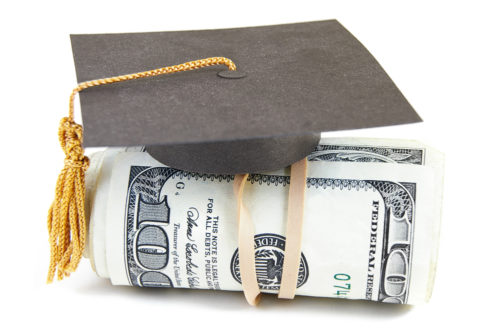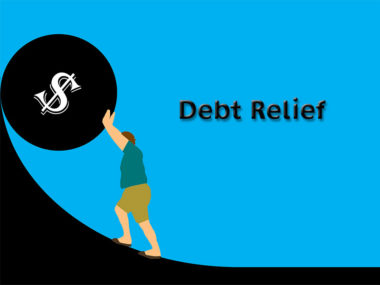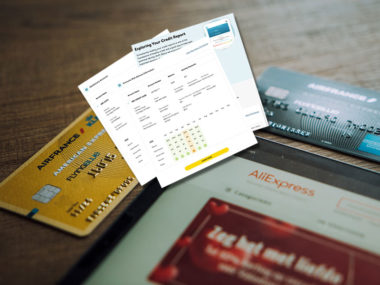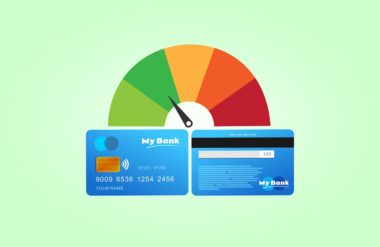Paying down your student loans begins with making payments early and paying more than the minimum that’s due. The more you pay off each month, the faster your student loans will disappear. It can also be helpful to prioritize your debt strategically, using methods like the snowball method or the avalanche method to pay off certain debts first.
Ultimately, one of the most important factors when it comes to paying off student loans is to cut spending and increase your income so that you can funnel any extra money to student loan payments. While this can be challenging when you’re just starting out after graduation, over the long term it can help you to pay off loans faster and free up your money for other financial endeavors.
Table of Contents
Determine How Much Student Loan Debt You Have
To have a feasible repayment plan, it’s important to possess a clear understanding of how much you owe and what the terms of your loans are. Even if it may be discouraging to look at the large number looming over your head, it’s helpful to get a good sense of exactly what you’re dealing with so that you can make a plan moving forward.
Depending on your situation, you may have multiple different loans from different lenders, and each loan may have different repayment terms and interest rates. In order to get a better sense of the big picture and view all of your information in one place, it can be helpful to create a spreadsheet including a breakdown of individual lenders and categories that include loan balances, minimum monthly payments, the term of the loan, the interest rate, and the due dates for payments.
Different types of loans may also have different repayment plans available to you. Be sure to do your research on your student loans, and figure out if you’re eligible for a plan that suits your budget. Whether you’re struggling to make the minimum payment each month or are looking to pay off your loans as quickly as possible, there are a variety of plans to suit your needs.
Create a Budget
Creating a budget can help you pay off student loans faster by making sure you understand where your money is going. If you don’t already have a working budget, spend some time going over your monthly expenses. While there are some expenses — like rent and bills — that are unavoidable, there are also probably areas that you could cut back on in order to save more money. Set a budget that works best for you, while still being able to accommodate the occasional treat.
Budgeting also helps give you a clear idea of how much money you make each month after your minimum expenses are taken care of. Once you have a working budget, you can go through and limit spending in non-essential areas when possible. This extra money can then be reallocated to paying off student loans. Budgeting and saving can be one of the most effective ways of paying off student loans fast, and every penny counts.
Cut Back Your Spending
Now that you have a clear understanding of what you make and spend each month, it’s time to look for places where you can potentially save money. Depending on your income level and lifestyle, there may be plenty of places where you can trim the fluff on your budget.
Rent:
Depending on where you live, the cost of renting a house or apartment can take up a good portion of your paycheck. While a good rule of thumb is to spend no more than one-third of your income on housing, many people living in major urban areas are forced to pay much more. Try to find an affordable living situation if you can, even if that means living with roommates or your family. If you can’t find affordable housing in your area, consider moving somewhere with a lower cost of living.
Groceries and Restaurants:
After rent, food can often be one of the biggest monthly expenses for recent grads, and it can be easy to spend too much money on pricey luxuries, dinners, and drinks. When trying to cut down on your grocery budget, it’s a good idea to ditch the restaurants and learn how to cook if you don’t already know how. Even just a few cheap, simple, and tasty recipes can help to limit your spending, and you’ll learn some new skills in the process!
Bills and Utilities:
Depending on your living situation, you may be responsible for bills for gas, electricity, water, sewage, phone, and internet. You can decrease these bills by using your utilities mindfully and cutting back on usage when possible. Using less electricity, less heat in the winter, and less air conditioning in the summer can all help you save a little on your monthly bills. If you pay for phone and internet services, consider shopping around for the cheapest provider, and opt for a no-frills basic plan if possible.
Transportation:
Unless you live within walking distance of everywhere you need to be, transportation is probably a part of your monthly budget. If you can, try to live somewhere centrally located near work, family, and friends to cut down on commuting. If possible, you can use public transportation to help cut down on car costs.
If you do have a car, make sure to spend the money to ensure that it gets regular maintenance and care. Preventative maintenance can dramatically extend the life of a car and ensure that you get your money’s worth. If you’re thinking of purchasing a new car, considering opting for a cheaper used model so that you’re not saddled with student loan payments and car payments at the same time.
Entertainment:
Depending on your income and lifestyle, your budget for entertainment can vary pretty widely. But if you’re trying to pay down your student loans quickly, cutting back on entertainment is one of the easiest ways to cut down on expenses. Whether you pay for a whole host of monthly streaming services or drop a hundred dollars on drinks with friends, you could stand to save a lot each month if you budget more carefully. Reducing your entertainment budget can also be a great way to explore fun new low-cost activities, both by yourself and with friends.
Consider getting a library card — if you don’t already have one — for free, easy access to books, movies, and more. Rather than go on expensive trips or drink fancy cocktails with friends, consider exploring local parks and trails, or spend a night at home cooking together. Even when you’re trying to save, it’s important to allow room in your budget for a little fun now and then — it will help you stick to the budget as a whole.
Other stuff:
If you don’t have a clear budget and track your spending each month, it’s possible that you’re wasting money on a bunch of stuff that you don’t even realize. Impulse purchases, new clothes that you don’t need, and new gadgets that you could really live without can have a way of eating up your budget in no time.
When trying to pay off your student loans, it’s important to think long and hard about unnecessary purchases, and consider the ways they might affect your financial future. In most cases, you’ll be just as happy without whatever the item is, and this practice can help you save a good chunk of money each month.
When trying to stick to a budget, cutting spending is one of the easiest ways to save money and pay down your student loans. Focus on your needs instead of your wants, and explore fun and easy ways to live a low-cost lifestyle. Just because you’re on a budget doesn’t mean you need to be an ascetic — you can have fun, spend time with family and friends, and even learn a few new skills along the way, all while sticking to a budget.
Supplement Your Income
After cutting spending, one of the most important steps you can take to pay down your student loans is to increase your income and use that money to increase your monthly loan payments. Once you’ve set up a budget based on your current income, you can quickly and easily funnel any extra money straight to student loans.
Windfalls:
Anytime you get extra money in the form of a tax return, gift money, bonuses, or other unexpected windfalls, you can put that money directly towards student loans. It can be tempting to spend any extra or serendipitous money as soon as you receive it, but using it to pay off student loans will help you reap future rewards.
Income increases:
Aside from unexpected cash windfalls, you can also increase your income on your own. If you’re underemployed or making less than you think you should, look around for jobs with higher salaries that are commensurate with your experience. Don’t be afraid to take risks when it comes to job applications and apply for jobs that you think might be out of your reach.
If you’re happy with your current job, consider taking on more responsibilities, learning new on-the-job skills, and eventually asking for a raise. If you’ve been working for a while without increasing your income, it might be time to look elsewhere — changing jobs can oftentimes give you a dramatic income boost.
Side hustles:
If you’re already happily employed, you can supplement this income with a variety of side hustles. No matter what skills you have, there’s probably a way that you can monetize your talents in order to make money on the side. Whether you’re a great writer, tech-savvy, or simply have some extra time on your hands, there are plenty of ways to make a little extra cash.
Look for part-time, freelance positions that require your skills —bonus points if they’re remote and you can do them from the comfort of your own home and pajamas. You can also consider getting a part-time job at a nearby business in the evenings and weekends. If your side-hustle uses skills that you also employ in your career, you can even leverage this work into new job opportunities.
Sell stuff:
In addition to other side hustles, you can sell unwanted or old possessions to make a little extra money. If you have old electronics, furniture, or other stuff cluttering up your closet, consider selling it in order to pocket some extra cash. You can use popular sites like CraigsList to offload your unwanted belongings, or host a good old-fashioned yard sale.
Use the Grace-Period
Most federal loans come with a grace period, which is the time after graduation before you have to start paying back your student loans. Some private loans may also offer a grace period. Usually, this period is somewhere between six and nine months after you graduate or enroll less than full-time. In the case of unsubsidized and private loans, interest will still continue to accumulate over this period.
The grace period can be a great way to take stock of your financial situation and come up with a plan for repayment. If you get a job right out of college and are doing okay financially, you may want to start making payments on your student loans even if it’s not required. This can help you pay down interest faster and get a head-start on your loans. If you’re still getting your financial footing, so to speak, you can use this time to familiarize yourself with the various different repayment plans and choose one that works best for your financial situation.
Request or Negotiate a Modified Payment Plan
There are a variety of different repayment plans that depend on your individual situation and on what type of student loans you have. Take the time to research different plans and decide which one works best for you.
Types of Repayment Plans
Standard repayment plan:
Unless you apply for another type of repayment plan, the standard repayment plan is the default option for most student loans. Repayment takes place over the course of 10 years, after which you’ll have paid off your student loans in their entirety. Payments are the same amount each month.
Graduated payment plan:
The graduated repayment plan is similar to the standard repayment plan, and takes place over the course of 10 years. Instead of making equal monthly payments, however, payments start out somewhat lower and end up somewhat higher than the payments you would make on a standard plan. Over time, you’ll pay slightly more each month with this plan.
Extended payment plan:
The extended plan may include fixed or graduated payments, and takes place over the course of 25 years. This plan is only available to borrowers with over $30,000 worth of direct loans. Due to the accruement of interest, you’ll pay more over the course of this plan than you would with standard repayment.
Revised Pay As You Earn repayment plan (REPAYE):
On this plan, your monthly payments are limited to 10% of your discretionary income. You need to submit new financial information each year in order to remain eligible for this plan. After 20to 25 years of repayment, depending on your education level, all student loans will be forgiven. You may have to pay income tax on any forgiven loans.
Pay As You Earn repayment plan (PAYE):
PAYE is very similar to REPAYE, with a few added benefits. This plan is only available to students who took out loans after October of 2007. Payments are limited to 10% of discretionary income, and loans are forgiven after 20 years. In order to qualify for this plan, you also have to have a high debt-to-income ratio. You may have to pay income tax on any forgiven loans.
Income-based repayment plan (IBR): Like PAYE and REPAYE, this plan is based on your income. Monthly payments are limited to 10to 15% of your discretionary income, and all loans are forgiven after 20to 25 years. You may have to pay income tax on any forgiven loans.
Income-contingent repayment plan (ICR): On the income-contingent repayment plan, your monthly payments will be whichever is less: 20% of your discretionary income, or the amount that you would pay on a fixed repayment plan over the course of 12 years. Any remaining balance is forgiven after 25 years. You may have to pay income tax on any forgiven loans.
Income-sensitive repayment plan: On this plan, your monthly payments are based on your income, with your loans paid off in full after 15 years.
Make Extra Payments
One of the quickest ways to pay off student loans is to make extra payments. This can mean that you make loan payments several times a month, or that you pay more than the monthly minimum each time you make a payment. You can take advantage of any windfalls or extra cash to increase your student loan payment. Anything extra helps!
Set Up Autopay
Not only can missing a student loan payment derail your repayment plan, but it can also mess with your credit score and have other serious financial consequences. In order to ensure that you never miss a payment, it’s a good idea to set up autopay for all of your student loans. Using autopay, the monthly loan payment will automatically be deducted from your account when it is due. Autopay allows you to avoid extra fees, interest, and other penalties associated with late loan payments. Autopay will take the same amount from your bank account each month, allowing you to supplement this base payment with other smaller payments throughout the month.
See If You Qualify for Student Loan Forgiveness
If you work in the public sector, you may be eligible for student loan forgiveness. Whether you work for the government as a teacher, police officer, in local or state government, or in some other publicly funded position, you may be eligible for the Public Service Loan Forgiveness Program after 10 years of eligible payments. Be careful, though: it’s hard to get into these programs, and many people don’t qualify. You may also be eligible for loan forgiveness through your private employer. Some employers may offer to forgive your student loans after a period of employment, or may offer to contribute to the cost of student loans payments.
Consider Consolidation or Refinancing
If you have a variety of different loans or are struggling with high loan interest rates, you may want to look into consolidating or refinancing your student loans. When you consolidate your loans, you combine each of your individual student loans into one large loan. This can make it easier to keep track of how much you owe, and ensure that you only have one payment to worry about each month. When you consolidate loans, any outstanding interest you owe capitalizes and becomes part of the principal, which can result in additional interest accumulating each month. Most consolidated loans are still eligible for a variety of different repayment plans and loan forgiveness.
If you’re struggling with high-interest rates, you may want to consider refinancing your student loans. If you have good credit and stable income, refinancing can help to reduce your interest rates and ensure that you pay less over time. Refinancing makes you ineligible for many types of repayment programs, including income-based repayment options, but it disqualifies you from loan forgiveness.
Image Source: https://depositphotos.com/





